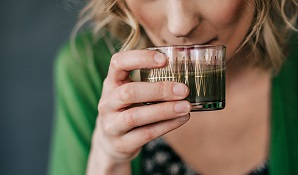We all wish we could slow down the ageing process. It turns out there are steps we can take to do just that. Here are seven things that science says will keep us youthful, fit and healthy as the years fly by.
Slap on the moisturiser and sunscreen Your skin carries the most obvious signs of ageing – wrinkles. The pharmaceutical and cosmetic industries make a fortune convincing women (and men) that it’s possible to reverse the signs of ageing. However, scientific research has shown that while some moisturising products can certainly plump up the skin, making wrinkles shallower, this is a temporary fix. The wrinkle has not been undone.
Sun exposure is responsible for much of the damage done to your skin over time, including wrinkles and discolouration. The good news is that continued use of a good moisturiser with an SPF or separate sunscreen can slow down the damage and the development of further wrinkles.
More good news is that there is no magic formula in the really expensive moisturisers – scientific studies have shown that any moisturiser will do the trick. So, find one that works on your skin and make sure you use it.
Keep exercising your whole life long Exercise is the closest thing we have to the elixir of youth. It’s common sense that the fitter you are, the better you’ll age, but scientific research bears this out. Researchers from King’s College London examined a group of cycling enthusiasts aged 55 to 79 years who didn’t smoke, drink heavily or have high blood pressure or any other health condition. The researchers measured their subjects’ VO2max values, a measurement of aerobic endurance during exercise that indicates cardiovascular fitness and compared them to the general population. They found that the subjects’ values had not decreased as much as the general populations had as they had aged – essentially, they had managed to delay this aspect of ageing.
Of course, it is not necessary to cycle to stay fit. Any regular exercise that elevates your heart rate and stretches your muscles – even just a brisk walk around the block – will help you to maintain a healthy weight, prevent various lifestyle diseases, strengthen bones and muscles, and improve your mood.
Don’t stop dancing Dance is a fantastic way to get exercise, but the benefits of moving to music don’t stop there. Studies have shown that not only does a regular dance exercise routine keep you fit, but it also maintains – and in some cases even improves – brain function. The various studies showed that dance improved general brain activity, memory, balance and coordination and mood – and that these benefits were not achieved through other forms of exercise. The more varied the dance routines, and the more steps to be memorised, the better the outcomes.
As an added bonus, dance tends to be more social than other exercise, so you benefit from the social interaction at dance classes as well as from the exercise.
The more you learn, the longer you live.
Hit the books – now and foreverStudies have shown that the more you learn, the longer you live – and not just because of the social benefits associated with an education. So keep your brain busy by learning for the rest of your life. But you don’t have to enrol for a PhD to be getting an education; instead do short courses, visit museums, attend talks or even self-study or watch YouTube videos to keep boosting your grey matter.
Have another helping of fruit and veggies – and nuts Vegetables are great for your skin and for your brain too! According to a study by the Rush University Medical Center in Chicago, people who ate one serving of green, leafy vegetables a day had a slower rate of decline on memory and thinking skills tests than people who rarely or never ate them.
Another study, published by Dermato Endocrinology, found that fruit, nuts and vegetables contribute to youthful looking skin because of their high levels of antioxidants, omega-3 fatty acids and some proteins. The study concludes, “Fruit and vegetables may represent the most healthy and safe method in order to maintain a balanced diet and youthful appearing skin.”
Of course, eating loads of vegetables is only half the battle. For the best ageing outcome, according to WebMD, you should eat a diet that’s also rich in whole grains, low-fat dairy, skinless poultry, lots of fish, nuts and beans and non-tropical vegetable oils, including canola, sunflower and olive oils. And avoid too much sugar or saturated fats.
Get your vices under controlEveryone knows it, but we’ll say it again: smoking ages you. To prove the point, researchers at the Department of Plastic Surgery at Case Western Reserve University in Ohio looked at 79 sets of twins with differing smoking habits (either one smoked and the other didn’t, or one had smoked for longer than the other). Photographs were taken of the subjects, providing striking visual evidence that smoking ages skin faster. This is because smoking reduces collagen formation and reduces skin circulation, and nicotine reduces skin thickness, all of which reduce skin elasticity and cause premature ageing.
And it’s not just your skin that ages faster when you smoke. According to a fact sheet from the World Health Organisation, quitting smoking by 30 gives you a life expectancy of almost ten years longer, while quitting after your first heart attack reduces your chances of suffering another by 50%.
As for drinking, there are studies that show that light to moderate drinking could be good for you. Moderate drinking is defined as 14 units a week for men, and seven units a week for women. However, a meta-study of long term studies on alcohol and death rates found that these studies are potentially flawed. Tim Stockwell, the director for the Centre for Addictions Research of British Columbia says, “Drink [moderately] for pleasure, but don’t kid yourself that it’s making you healthier.”
And as for heavy drinking, doctors estimate that it will lower your life expectancy by as many as 12 years. Heavy drinking is defined as more than four drinks on any one day or more than 14 drinks per week for men and more than three drinks on any one day or more than seven drinks a week for women.
Keep your friends close, and your significant other closer The renowned 75-year Harvard happiness study revealed some important findings about the relationship between happiness and ageing. There were three main, related findings:
- that people who are more connected to family, friends and their communities are happier, healthier and live longer,
- that people who have quality relationships – those that are supportive and caring – are in better health than those with less positive relationships, and
- that a stable, supportive life partnership improves quality of life and helps people to live longer.
This being the case, remember to prioritise your family relationships, friendships and ties with your community. Aside from keeping you happy, it will extend your life and good health.
There you have it Ageing well is at least partly about common sense - it’s no surprise that the things that are good for you are also the things that will help you age well physically, mentally and emotionally. It’s never too early - or too late - to incorporate some of these scientifically-backed behaviours into your routine.




